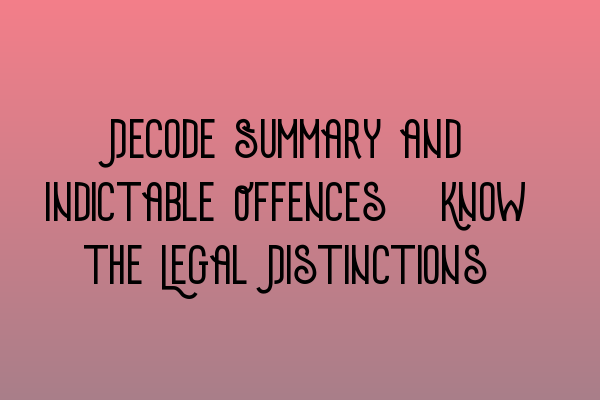Decode Summary and Indictable Offences: Know the Legal Distinctions
Understanding the legal distinctions between summary and indictable offences is crucial for anyone involved in criminal law. Whether you’re a law student preparing for the SQE exams or a professional in the field, having a solid grasp of these concepts is essential. In this article, we’ll delve into the differences between summary and indictable offences, providing you with the knowledge you need to succeed in your legal career.
Summary Offences: An Overview
Summary offences, also known as minor offences, are less serious crimes that are typically dealt with in a magistrates’ court. These offences include petty theft, public intoxication, and minor traffic violations. Summary offences are generally less complex in nature and carry a maximum penalty of 6 months in prison and/or a fine.
When preparing for your SQE exams, it’s important to familiarize yourself with the specific elements and legal framework of summary offences. SQE 1 Practice Exam Questions can be a valuable resource to test your knowledge in this area.
Indictable Offences: An Overview
Indictable offences, on the other hand, are more serious crimes that are typically tried in a Crown Court before a judge and jury. These offences include murder, robbery, and large-scale fraud. Indictable offences are often more complex in nature and carry higher penalties, including life imprisonment.
While preparing for your SQE exams, practicing with SQE 1 Practice Mocks FLK1 FLK2 can help you develop the necessary skills to analyze and handle indictable offences. These mock exams provide a realistic simulation of the SQE exams and allow you to refine your understanding of the legal principles associated with indictable offences.
Legal Distinctions
The legal distinctions between summary and indictable offences are primarily based on the seriousness of the crime and the maximum penalty associated with it. Summary offences are considered less severe and are dealt with in magistrates’ courts, while indictable offences are more serious and require a trial in a Crown Court.
It’s important to note that some offences can be either summary or indictable, depending on the specific circumstances. Known as either-way offences, examples include theft and assault. The decision of whether to treat an either-way offence as summary or indictable lies in the hands of the prosecution, who consider factors such as the severity of the crime and the defendant’s criminal history.
Preparing for the SQE Exams
If you’re currently studying for the SQE exams, it’s essential to enroll in high-quality SQE 1 and SQE 2 Preparation Courses. These courses provide comprehensive study materials, expert guidance, and exam-oriented practice sessions to help you succeed in your legal career.
Knowing the distinction between summary and indictable offences is just one aspect of criminal law that you’ll need to master for the SQE exams. The exams cover various areas of law, including contract law, criminal law, and dispute resolution. Make sure you are well-prepared by enrolling in reputable SQE 1 Preparation Courses.
Stay Updated on SRA SQE Exam Dates
Stay up-to-date with the latest SRA SQE exam dates to ensure you don’t miss any important deadlines. Familiarize yourself with the exam schedule and allocate sufficient time for preparation.
In conclusion, understanding the legal distinctions between summary and indictable offences is crucial for anyone involved in criminal law. Whether you’re a law student preparing for the SQE exams or a professional in the field, mastering these concepts will contribute to your success. Be sure to explore SQE 1 Practice Exam Questions, SQE 1 Practice Mocks FLK1 FLK2, SQE 2 Preparation Courses, SQE 1 Preparation Courses, and SRA SQE Exam Dates to enhance your knowledge and expertise in criminal law.
